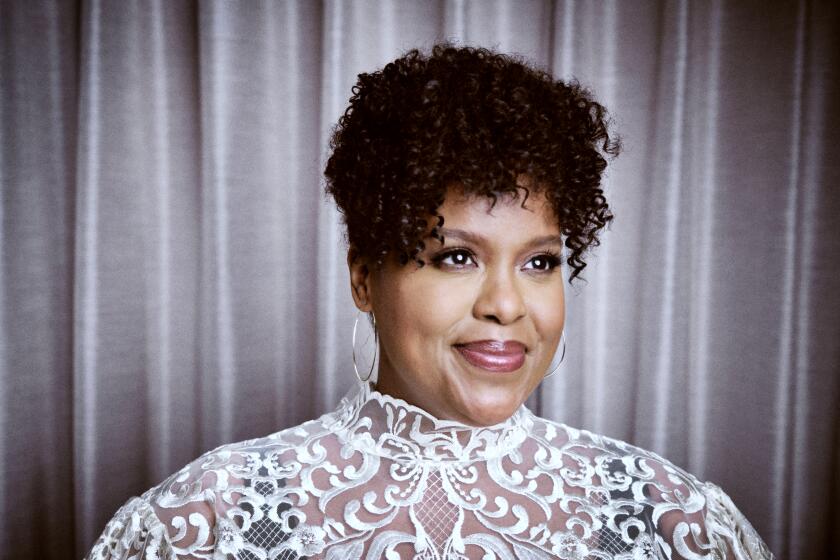Amazon’s new comedy can’t avoid ‘Sex and the City.’ But in key ways, it surpasses it
- Share via
HBO’s bar-setting series “Sex and the City” returns next week with “And Just Like That...,” a limited series reboot of the ‘90s comedy about four single women navigating love and careers in New York City. But this review isn’t about that show — or “Girls” or “Run the World” or any of the other series that have turned “comedy featuring four single women navigating love and careers in New York City” into a familiar TV trope.
The Black women of “Harlem,” a 10-episode streaming comedy premiering Friday on Amazon, are decades younger than — and a few ZIP Codes apart from — Carrie, Miranda and Charlotte. (Samantha, absent from “And Just Like That...” presumably landed back in L.A.) But they still eloquently saunter and drunkenly stumble in the stilettoed footsteps of those 20th century, Cosmopolitan-sipping pioneers. The question is whether adjunct anthropology professor Camille (Meagan Good); successful queer dating app creator Tye (Jerrie Johnson); trust-fund fashion designer Quinn (Grace Byers); and out-of-work singer-actor Angie (Shoniqua Shandai) have anything to add to the sisterhood-in-the-city playbook.
The multi-hyphenate calls her directorial debut for the HBO series ‘a call to arms for authenticity.’ But getting there took a lot of growth.
The answer: absolutely, though the clunky pilot episode of “Harlem” may lead you to believe otherwise. The characters at first appear cast from the very mold used by HBO more than 20 years ago: Camille is the responsible one who overthinks things, pining after her ex and making bad choices when she second-guesses herself. (She is also, in a move that can’t help but call to mind Carrie Bradshaw, the series’ voiceover.) Tye is a disciplined, confident businesswoman with a commitment problem. Quinn still openly believes in true love, even in the world of scammy dating apps. And Angie has no edit button, especially when talking about men, sex, men and more sex.
But “Harlem,” created by “Girls Trip” writer Tracy Oliver, eventually has much more to offer than a modern Black overlay on a beloved but very white series. Each character grows more interesting as the series proceeds thanks to strong character development and sharp writing, and the chemistry among the performers becomes the bond that carries the show as the women become entangled in one another’s relationship disasters and work dilemmas. For example, Angie may be a professional freeloader, crashing on Quinn’s couch indefinitely, eating her food and using her Uber account. But when Quinn is ripped off by a bad date on Long Island (adding insult to injury), Angie shows up like a superhero. (“Harlem” also tweaks the girls-in-the-city formula by adding a gay character to the inner circle with Tye.)
It also underscores the limitations of “SATC’s” whitewashed New York: Some of “Harlem’s” most fascinating conversations and scenarios deal with the characters’ varying, and anything but static, ideas of Blackness — culturally, personally, comically. And the gentrification of Harlem is part of the story here too. Locals are getting priced out of the neighborhood and landmarks are being snapped up by chain stores: “Do you think we’ll live long enough to see a Sephora change back into a jazz club?” one girlfriend asks another.
But “Harlem” doesn’t drown in its social consciousness, either. Camille’s excited that the new head of her department at Columbia is a Black woman (Whoopi Goldberg) until she finds that she has to jump through just as many — if not more —hoops to impress her. The young professor organizes a rally against gentrification to impress her boss, but before giving her speech, she has to correct the impassioned claims of the previous speaker: No, Black men did not invent food, she informs the crowd.
Dating provides more of the quick-witted banter that makes this series pop. Hopeful romantic Quinn keeps getting catfished, so when she finally connects with a real, flesh-and-blood man on a video chat, her friends cheer. Then they stop short and assess their reason for the joyous outburst: “It’s a sad day for society when all a man has to do [to be good] is exist.”
‘Harlem’
Where: Amazon Prime
When: Any time, starting Friday
More to Read
The complete guide to home viewing
Get Screen Gab for everything about the TV shows and streaming movies everyone’s talking about.
You may occasionally receive promotional content from the Los Angeles Times.








